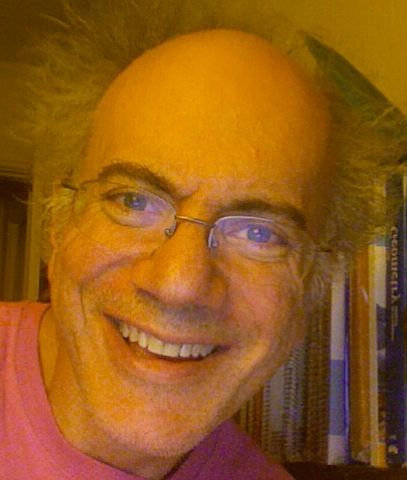
Dan Plonsey
Website: http://danplonsey.bandcamp.com
Bio: Composer and improviser Dan Plonsey studied with Martin Bresnick and Anthony Braxton. Commissions have come from Bang on a Can, SF's Jewish Music Festival, Real Time Opera, and others, though most of his ~60 recordings are of his own ensembles: mixed ensembles of a dozen musicians, plus or minus; sax quartet; toy orchestra & Fred Frith; and solo. Works range from five sets of many shorter pieces (approximately 300 total), to the one-two hour long “seasons.” Most recently he's been working on the massive Concert Band 1, for which he plays all the wind instruments; and large ensemble pieces featuring vocalist (wife) Mantra Plonsey. Plonsey also cofounded The Composers' Cafeteria, Beanbenders' performance series, and taught math at Berkeley High for 18 years.
Statement: As it happens, the question of Identity has been looming behind me since retirement from teaching math in June. I sit at my desk trying to work, and I feel a vanishing presence: I spin around -- and there's the afterimage of the back of my head. There is a notion that the music we play and/or listen to is an expression of our identity(ies). Granted, I have explored this idea literally over the years in various explicitly autobiographical creations: "The Plonsey Episodes" (for the Bang on a Can All Stars) "Leave Me Alone!" (opera by Harvey Pekar about Dan Plonsey and his music), "Dan Plonsey's bar Mitzvah," "And the Way the World Dicked him Around" (okay, that one's a bit over the top!); the "Daniel Popsicle" alter ego as a band of deliberately uneven quality; not to mention a semi-autobiographical novel and film, both in progress. As well, I've been told, and I agree, that my music sounds like me. But most who engage in improvised music -- in particular those who trace their lineage from jazz traditions as I do -- think to some degree about the expression of oneself through one's sound. Most of this music will be improvised, or written with the idea of encouraging people to play who they are. This series of shows allows me to engage with many of the key members of my musical community. I'm very grateful to Randy Hussong for the opportunity to do so over the course of six sets, which allows me to keep each group small. I'm excited to bring Mantra into these different contexts, to add her voice in song and story to music which, though as stated is very much of and about the people playing, yet has the appearance of being artistically abstract. Harvey Pekar taught us about that apparent contradiction: he advocating sticking to reality in our art, most significantly, utilizing autobiography; while at the same time, the music he most loved was abstract instrumental jazz of all eras, and especially of artists who were relatively obscure. I think it's because of what he told me after an especially upsetting real-life incident: "There are some things you just can't put into your [autobiographical] work." But they're all there in music.